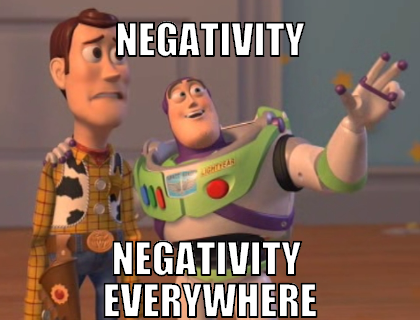When you run a company or manage a team big enough to not fit in a room, one problem you are going to face is interpersonal conflicts. Your sub-ordinates are going to complain about each other how that guy isn’t working well, he isn’t communicating properly, he always misses deadlines, etc.
Some of the points raised might be genuine issues with real proof of how that team member screwed up. But many times, the conflict is probably a misunderstanding. The problem with having one-on-one meetings is it is focussed too much about the issues/problems with others. There is too much negativity.

People tend to share negative feedback more than positive feedback
- Q1: When was the last time you purchased something from Amazon or took an Uber ride?
- Personally, I buy something almost every week and use Uber twice daily.
- Q2: When was the last time you left a feedback about the product/uber? Was it positive or negative?
- I have never in my life posted a positive feedback about a product/service. But multiple times I have left negative feedback, especially about a bad Uber ride I had.
We always share negative reviews about something more than positive reviews. Studiesshows that we are 3x more likely to share a negative experience than positive experience, be it through social media or word of mouth.
Now the problem with bad reviews is what the next section is about.
You need 10-12 Positive Customer Reviews to Make Up for One Negative Review
This is common metric seen in online sites which has review systems. Marketers dread negative reviews as even a single bad review will change the perception of your product amongst customers. This happens for humans too.
People tend to remember negative incidents/emotions more vividly and it clouds the ability to judge a person correctly. You might have helped your team member a great deal – helped him with debugging some production issue, crafted emails for him to respond to customers, rush to finish a project that was handed over just a day back or even taken the blame for a production issue. But all this will be forgotten if you missed one instant message in slack.
Handling Conflicts
As a manager your sub-ordinates are going to come to you and raise any issues that they have with others in your team. The common way to handle this kind of conflict is to talk to the person against whom the complaint is about and ask them to solve it. But before you leave the room to bring the other person in, ask the person who is complaining the following two questions.
Q1: Can you think of any one positive experience/incident with the other person?
Ask the complaining guy to recall and tell about some positive incident with the other person, one where he helped him out and saved the day. Since they are all working together in a team, there would definitely be an incident or two where he would have helped him out.
This question is very important as it helps the complaining person to think real hard for the “positive reviews” for the other person. The more positive experiences he can come up with, he would realise that he is just overreacting to some small minor issues. This would help put things in perspective.
If he can’t come up with even a single positive incident, the next question will be even more harder.
Q2: Can you tell me one incident where you helped the other guy out?
This question is even more important than the first as this shows how often the complaining person has gone out of the way to help him, even if he dislikes him. You can’t keep complaining about a person and keep claiming that he has done nothing for you. The other guy can claim similar issues with you and it would just be a blamefest.
The reason these two questions are important is it helps bring out a balanced outlook about a person. Everyone would have negative attributes, but it is also important to look at the positive attributes and judge them on both.
How to fix you relationship with your colleague
Relationships cannot be transactional. You can’t expect others to also give you back the same kind of help/communication as you do. But he might be able to help you out in a different form.
If you are a project manager, and keep complaining about a developer that he isn’t communicating enough with you, go out of the way to make things easier for him to communicate. Maybe talking directly face-to-face is hard for him, but he is comfortable tracking things using an issue tracker. Go signup for the issue tracker and start using it. He would be more than happy to share every status updates about the project. Developers love structure.
If you go out of the way and help him out, maybe that one day when you forget to communicate a deliverable date, the developer would pull an all-nighter and get the project done and save the customer.
Sometimes you need to give more than what you receive in the short term. You would feel like a loser, but karma would catch up and you might even end up getting back more than what you expected.
So who are you going to help out today?
PS: Don’t start your one-on-one meetings with “What issues you have?” Instead start it with “What was great?”

